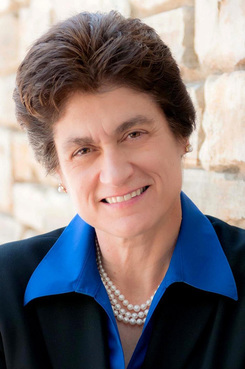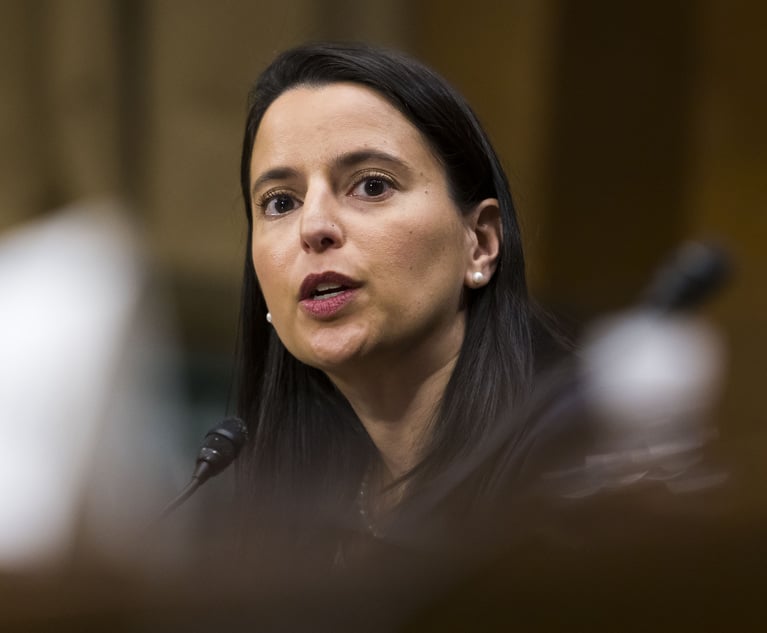Judicial Discipline Records Face First-Ever Audit After Deal Ends Dustup
State lawmakers in 2016 ordered the first audit of the commission in its 56-year history.
September 19, 2018 at 06:28 PM
4 minute read
 Elaine Howle.
Elaine Howle.The Commission on Judicial Performance and the state auditor formally ended their litigation over confidential disciplinary files Tuesday, when an appellate court approved a request to give the auditor access to the records.
The First District Court of Appeal reversed a December 2017 order by San Francisco Superior Court Judge Suzanne Bolanos that blocked the auditor, Elaine Howle, from starting a legislatively mandated review of the commission's disciplinary practices. The appellate court's order was issued one day after Gov. Jerry Brown signed legislation clarifying that Howle's office cannot make public any records it obtains during the audit.
“The Superior Court decision might … have encouraged other state and local agencies to evade or resist audits of their activities,” Howle's attorney, Myron Moskovitz, said in an email. “So the state auditor is … happy that this problem has been eliminated.”
Kerr & Wagstaffe partner Michael von Loewenfeldt, who represented the commission, did not immediately return a message seeking comment.
A six-page settlement agreement released Wednesday said the two parties will issue a joint statement within seven days of the court order announcing that the lawsuit was settled “in the best interests of the public.”
Read the settlement agreement between the CJP and the state auditor:
“However neither party shall claim that they 'prevailed' on the appeal or that the reversal was anything other than a stipulated result reached after settlement discussions,” the agreement said.
The two agencies had signaled an end to the two-year-old dispute in August when the related legislation was introduced and the commission proposed amending its operating rules to allow the auditor to review confidential records. Commission leaders had argued that without the rule change they were barred by law from sharing documents with Howle.
State lawmakers in 2016 ordered the first audit of the commission in its 56-year history after complaints from judges and litigants about the judicial disciplinary process and its secrecy.
The commission, citing confidentiality laws, sued the auditor in October 2016 to block her access to discipline documents. Howle said she and her staff would abide by those laws. More than a year later, Bolanos sided with the commission, finding that the agency had a “constitutional right to control the confidentiality of its documents.”
The auditor appealed the ruling this year. During budget hearings, legislators, trying to pressure the commission to allow the audit, stripped $500,000 from the agency's 2018-19 budget—an amount equal to the estimated cost of the audit. In June, lawmakers restored the money and one month later the commission proposed the confidentiality rule change.
Moskovitz said the audit should begin in a few days. Both sides will bear their own legal fees and litigation costs, according to the settlement agreement.
Read more:
Contra Costa Judge Accused of Sexual Harassment, Improper Comments
Deal Would Allow First Audit of Judicial Performance Agency
Ex-Court Commissioner Censured for Inflammatory Facebook Posts
Inside The Recorder's Request for Judicial Workplace Harassment Records
This content has been archived. It is available through our partners, LexisNexis® and Bloomberg Law.
To view this content, please continue to their sites.
Not a Lexis Subscriber?
Subscribe Now
Not a Bloomberg Law Subscriber?
Subscribe Now
NOT FOR REPRINT
© 2025 ALM Global, LLC, All Rights Reserved. Request academic re-use from www.copyright.com. All other uses, submit a request to [email protected]. For more information visit Asset & Logo Licensing.
You Might Like
View All
Judge Accuses Trump of Constitutional End Run, Blocks Citizenship Order
3 minute read
Chicago Law Requiring Women, Minority Ownership Stake in Casinos Is Unconstitutional, New Suit Claims
5 minute read
Trending Stories
- 1Litigators of the Week: US Soccer and MLS Fend Off Claims They Conspired to Scuttle Rival League’s Prospect
- 2Litigator of the Week Runners-Up and Shout-Outs
- 3U.S.- China Trade War: Lawyers and Clients Left 'Relying on the Governments to Sort This Out'
- 4Willkie Adds Five-Lawyer Team From Quinn Emanuel in Germany
- 5AI Discrimination and the 10-Step Bias Elimination Audit
Who Got The Work
J. Brugh Lower of Gibbons has entered an appearance for industrial equipment supplier Devco Corporation in a pending trademark infringement lawsuit. The suit, accusing the defendant of selling knock-off Graco products, was filed Dec. 18 in New Jersey District Court by Rivkin Radler on behalf of Graco Inc. and Graco Minnesota. The case, assigned to U.S. District Judge Zahid N. Quraishi, is 3:24-cv-11294, Graco Inc. et al v. Devco Corporation.
Who Got The Work
Rebecca Maller-Stein and Kent A. Yalowitz of Arnold & Porter Kaye Scholer have entered their appearances for Hanaco Venture Capital and its executives, Lior Prosor and David Frankel, in a pending securities lawsuit. The action, filed on Dec. 24 in New York Southern District Court by Zell, Aron & Co. on behalf of Goldeneye Advisors, accuses the defendants of negligently and fraudulently managing the plaintiff's $1 million investment. The case, assigned to U.S. District Judge Vernon S. Broderick, is 1:24-cv-09918, Goldeneye Advisors, LLC v. Hanaco Venture Capital, Ltd. et al.
Who Got The Work
Attorneys from A&O Shearman has stepped in as defense counsel for Toronto-Dominion Bank and other defendants in a pending securities class action. The suit, filed Dec. 11 in New York Southern District Court by Bleichmar Fonti & Auld, accuses the defendants of concealing the bank's 'pervasive' deficiencies in regards to its compliance with the Bank Secrecy Act and the quality of its anti-money laundering controls. The case, assigned to U.S. District Judge Arun Subramanian, is 1:24-cv-09445, Gonzalez v. The Toronto-Dominion Bank et al.
Who Got The Work
Crown Castle International, a Pennsylvania company providing shared communications infrastructure, has turned to Luke D. Wolf of Gordon Rees Scully Mansukhani to fend off a pending breach-of-contract lawsuit. The court action, filed Nov. 25 in Michigan Eastern District Court by Hooper Hathaway PC on behalf of The Town Residences LLC, accuses Crown Castle of failing to transfer approximately $30,000 in utility payments from T-Mobile in breach of a roof-top lease and assignment agreement. The case, assigned to U.S. District Judge Susan K. Declercq, is 2:24-cv-13131, The Town Residences LLC v. T-Mobile US, Inc. et al.
Who Got The Work
Wilfred P. Coronato and Daniel M. Schwartz of McCarter & English have stepped in as defense counsel to Electrolux Home Products Inc. in a pending product liability lawsuit. The court action, filed Nov. 26 in New York Eastern District Court by Poulos Lopiccolo PC and Nagel Rice LLP on behalf of David Stern, alleges that the defendant's refrigerators’ drawers and shelving repeatedly break and fall apart within months after purchase. The case, assigned to U.S. District Judge Joan M. Azrack, is 2:24-cv-08204, Stern v. Electrolux Home Products, Inc.
Featured Firms
Law Offices of Gary Martin Hays & Associates, P.C.
(470) 294-1674
Law Offices of Mark E. Salomone
(857) 444-6468
Smith & Hassler
(713) 739-1250







